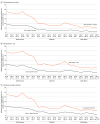Trends in Self-reported Forgone Medical Care Among Medicare Beneficiaries During the COVID-19 Pandemic
- PMID: 35977302
- PMCID: PMC8796880
- DOI: 10.1001/jamahealthforum.2021.4299
Trends in Self-reported Forgone Medical Care Among Medicare Beneficiaries During the COVID-19 Pandemic
Abstract
Importance: Evidence suggests that the COVID-19 pandemic has had a negative association with medical care access. As prior studies mainly focused on the initial stage of the COVID-19 pandemic, less is known about how trends in forgone medical care changed over time.
Objective: To examine trends in and reasons for forgone medical care among Medicare beneficiaries during the COVID-19 pandemic.
Design setting and participants: This cross-sectional study analyzed Medicare beneficiaries using data from 3 waves of survey data from the Medicare Current Beneficiary Survey COVID-19 Supplement (Summer 2020, Fall 2020, and Winter 2021). Data analyses were conducted between July and August 2021.
Exposures: Date of interview.
Main outcomes and measures: Self-reported forgone medical care because of COVID-19.
Results: A total of 23 058 Medicare beneficiaries were included (13 005 women [56.4%]; 10 445 [45.3%] 75 years old and older). The survey response rates for each wave were 72.6%, 78.95, and 79.6%, respectively. The rates of reported forgone medical care because of COVID-19 decreased from the week of June 7, 2020, to the week of April 4 to 25, 2021, but the largest difference in the rates was found between June 7 and July 12, 2020 (22.4% to 15.9%). Physician-driven factors accounted for about 70% of the forgone medical care. The proportion of those who reported forgoing medical care because of physician-driven factors tended to decrease from 66.2% in the week of July 7, 2020, to 44.7% in the weeks of April 4 to 25, 2021. The likelihood of forgone medical care was 4 percentage points (95% CI, 0.03-0.05) higher among those who reported feeling more stressed or anxious than those who did not, 3 percentage points (95% CI, 0.01-0.04) higher among those who reported feeling more lonely or sad than those who did not, and 3 percentage points (95% CI, 0.01-0.04) higher among those who reported feeling less socially connected than those who did not.
Conclusions and relevance: The results of this cross-sectional survey study suggest that the COVID-19 pandemic may exacerbate existing barriers to care and lead Medicare beneficiaries to delay needed care. Policy makers must continue to identify effective means of meeting the forgone care backlog and maintaining continuity of care, especially for those with mental health problems.
Copyright 2021 Park S et al. JAMA Health Forum.
Conflict of interest statement
Conflict of Interest Disclosures: None reported.
Figures



References
MeSH terms
LinkOut - more resources
Full Text Sources
Medical
Research Materials
Miscellaneous

